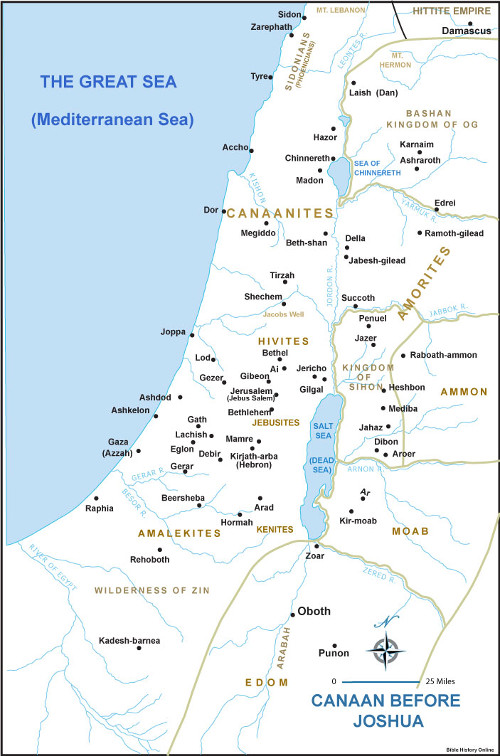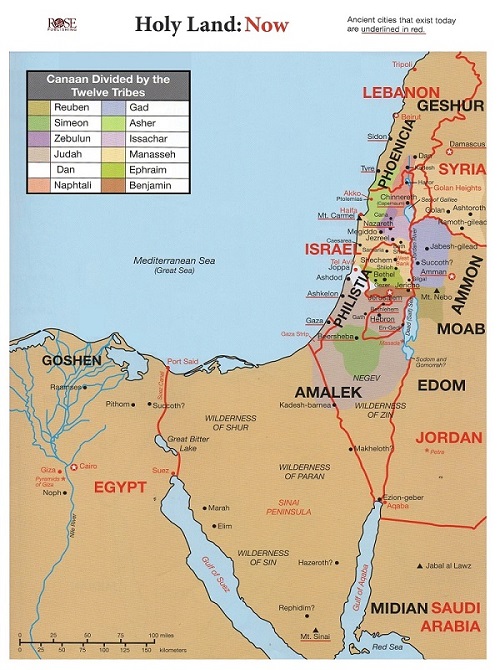Bashan was a region in the Old Testament that now correlates to Golan Heights and part of southern Syria. Before Moses and Joshua led the Israelites over the Jordan River, Bashan was mostly known as the kingdom of Og as stated in Deuteronomy 4:47, Deuteronomy 29:7 and Joshua 12:4. According to a few different references in the book of Joshua, king Og "reigned in Ashtaroth and Edrei" - towns stated in Deuteronomy 1:3-4. Joshua 13:31 called them his "royal cities". Joshua led the Israelites against king Og and defeated him at Edrei, one of his 2 primary cities. The third town known to be in Bashan was Golan which only appeared in Deuteronomy 4:43, Joshua 20:8 and 21:27, and 1 Chronicles 6:71, mostly in regards to having been assigned as a city of refuge.
A portion of the kingdom of Bashan was called Argob in Deuteronomy 3:4,13-14 then later called a district during Solomon's reign as stated in 1 Kings 4:8,13. Argob was said to have been the last place where Rephaites, a race of giants lived.
Numbers 21:32-35:
32. After Moses had sent spies to Jazer, the Israelites captured its surrounding settlements and drove out the Amorites who were there.
33. Then they turned and went up along the road toward Bashan, and Og king of Bashan and his whole army marched out to meet them in battle at Edrei.
34. The LORD said to Moses, "Do not be afraid of him, for I have handed him over to you, with his whole army and his land. Do to him what you did to Sihon king of the Amorites, who reigned in Heshbon."
35. So they struck him down, together with his sons and his whole army, leaving them no survivors. And they took possession of his land.
Numbers 32:33:
33. Then Moses gave to the Gadites, the Reubenites and the half-tribe of Manasseh son of Joseph the kingdom of Sihon king of the Amorites and the kingdom of Og king of Bashan--the whole land with its cities and the
territory around them.
Deuteronomy 3:1-14 is packed with good information about the region where Jair was accredited for conquering 60 towns as part of the area known as Havvoth Jair (settlements of Jair). Two more Bashan references in Deuteronomy: a statement about the "choice rams of Bashan" in Deuteronomy 32:9-14 and a mention of Bashan by Moses as he blessed the tribes of Israel in Deuteronomy 33:22 before he died.
Either the regions of Geshur and Maacah were allied with Og, or they had been taken as Og's influence waned before Joshua entered the region.
Joshua 13:8-12,29-32:
8. The other half of Manasseh, the Reubenites and the Gadites had received the inheritance that Moses had given them east of the Jordan, as he, the servant of the LORD, had assigned it to them.
9. It extended from Aroer on the rim of the Arnon Gorge, and from the town in the middle of the gorge, and included the whole plateau of Medeba as far as Dibon,
10. and all the towns of Sihon king of the Amorites, who ruled in Heshbon, out to the border of the Ammonites.
11. It also included Gilead, the territory of the people of Geshur and Maacah, all of Mount Hermon and all Bashan as far as Salecah--
12. that is, the whole kingdom of Og in Bashan, who had reigned in Ashtaroth and Edrei and had survived as one of the last of the Rephaites. Moses had defeated them and taken over their land.
...
29. This is what Moses had given to the half-tribe of Manasseh, that is, to half the family of the descendants of Manasseh, clan by clan:
30. The territory extending from Mahanaim and including all of Bashan, the entire realm of Og king of Bashan--all the settlements of Jair in Bashan, sixty towns,
31. half of Gilead, and Ashtaroth and Edrei (the royal cities of Og in Bashan). This was for the descendants of Makir son of Manasseh--for half of the sons of Makir, clan by clan.
32. This is the inheritance Moses had given when he was in the plains of Moab across the Jordan east of Jericho.
Ezekiel 27:6, Isaiah 2:13, and Zechariah 11:2 all referred to oak trees that once grew in Bashan.
Bashan was basically given to half of the tribe of Manasseh (compare the maps of Canaan before Joshua & the Canaan division of land)

